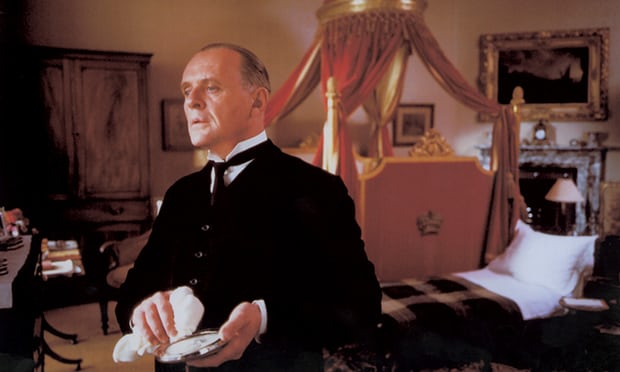Every time I watch this movie, I get a chill in my spine. Here is why, I, like most other ambitious, uptight men tend to put a lid to our emotions. How many potential relationships have I sabotaged by such pretense?
We eventually lose out.
Here is a story of a butler who sacrificed body and soul to service in the years leading up to World War II and realizes too late how misguided his loyalty was to his lordly employer.
It is a tale of a man so burdened by propriety that he lets the love of his life slip through his fingers. Mr. Stevens is chief of staff at an English stately home; as the movie opens, in the summer of 1956, he is set to undertake a motoring trip to visit Miss Kenton, a housekeeper who left 20 years earlier to get married. The butler says he wants to ask her if she’d consider returning to work: “Miss Kenton, with her great affection for this house, with her exemplary professionalism, was just the factor needed to enable me to complete a fully satisfactory staff plan for Darlington Hall.” But Stevens isn’t fooling anyone, especially when he lets slip that a letter (“her first in seven years, discounting Christmas cards”) contains hints her marriage is falling apart. During the trip Stevens also recounts stories of his contemporaries—butlers in other houses with whom he struck up friendships. Stevens’s most notable relationship by far, however, is his long-term working relationship with Miss Kenton. Though Stevens never says so outright, it appears that he harbors repressed romantic feelings for Miss Kenton.
Stevens reminisces grandly about his former employer, Lord Darlington, an aristocrat who aligned himself with the Nazis and eventually died in disgrace. He sifts through memories of his father – a butler himself, who was aloof to the point of abuse – and holds forth about “dignity”, a concocted ideal that has to do “with a butler’s ability not to abandon the professional being he inhabits”.
In the totality of his professional commitment, Stevens fails to pursue the one woman with whom he could have had a fulfilling and loving relationship. His prim mask of formality cuts him off from intimacy, companionship, and understanding.
Each journal entry becomes a mannered exercise in avoidance and projection. When Stevens reaches a sensitive subject – such as whether Miss Kenton was driven away by his refusal to admit his feelings for her – he veers off into self-protective prattling, carrying on for pages before he feels able to continue. “All in all,” he writes tellingly, “I cannot see why the option of her returning to Darlington Hall and seeing out her working years there should not offer a very genuine consolation to a life that has come to be so dominated by a sense of waste.”
We get a picture of a man trying desperately to keep a lid on his emotions.
The Remains of the Day is a movie about a thwarted life. It’s about how class conditioning can turn you into your own worst enemy, making you complicit in your own subservience.
The movie is about love. Stevens is forced to let go of his illusions about Lord Darlington, his filial pride, his cherished “dignity”, until all that remains is Miss Kenton and what might have been.
The movie is an adaptation of a novel by same name, The Remains of the Day by the Nobel Prize winner, Kazuo Ishiguro.
If you haven’t watched the movie or read the book, do so now, whatever you do – don’t keep your feelings to yourself.

